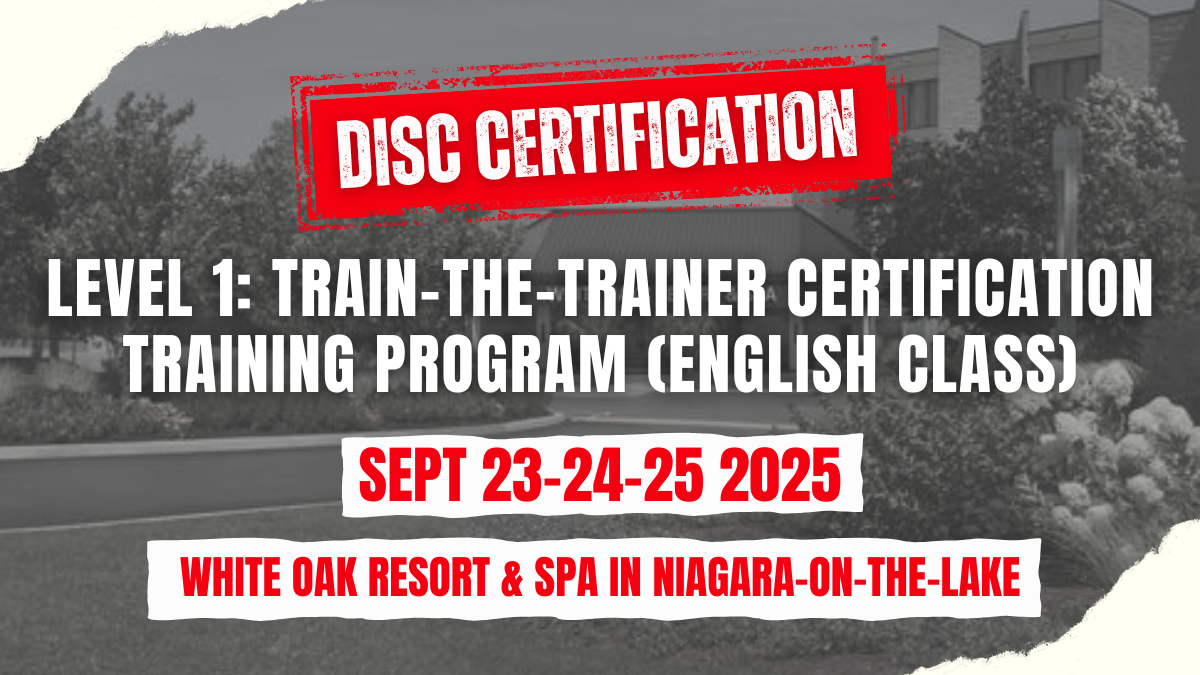The workplace is evolving at a rapid pace, bringing challenges that businesses must address head-on. Technology is advancing, employee expectations are shifting, and economic uncertainty demands greater adaptability. So here’s the big question: is your organization’s HR approach keeping up?
HR today is no longer just about policies or recruitment. It’s a skill set—a mindset—that everyone in the organization needs to embrace. To thrive, organizations must move beyond traditional approaches, empowering every team member to contribute to people-focused success.
This blog, the seventh and last in our ongoing series, builds on insights shared in part 1, part 2, part 3, part 4, part 5, and part 6, where we explored the workplace’s dynamic evolution. Together, these discussions highlight the unconventional strategies businesses need to navigate and thrive in these changing times. But today, we’ll explore why supercharging HR skills is essential and how tools like DISC can help transform your organization.
The Changing Dynamics of the Workplace
Workplaces today are shaped by three critical forces: technological advancements, shifting social norms, and economic pressures. These changes have pushed organizations to rethink what drives success. While physical assets once held center stage, the focus has shifted to people expertise—the ability to motivate, develop, and collaborate effectively to achieve both business and personal outcomes.
This shift is where the concept of boundaryless HR comes in. It’s a response to the complexities of modern workplaces, breaking free from traditional, siloed HR structures to create a more collaborative, integrated approach. Boundaryless HR enables organizations to adapt and thrive in an era of rapid change. Let’s dive deeper into what this mindset is and why it matters.
What is Boundaryless HR?
Boundaryless HR is about tearing down walls—between departments, disciplines, and even external stakeholders. It transforms HR into an integrated, cross-functional discipline that aligns with organizational goals.
With this approach, HR professionals are empowered to act as orchestrators, coaches, and cocreators, moving beyond traditional administrative roles. But more importantly, it ensures that HR’s influence extends across the entire organization.
But why should HR skills extend beyond just the HR department?
Here’s a bold truth: HR skills are too important to be confined to the HR department. As Gabriel Sander, head of human resources at Cuervo aptly said, “Every person who works with other people has to be good at HR.”
Think about it. Leaders, managers, and employees alike engage in HR-related activities every day. Whether giving feedback, supporting development, or reinforcing workplace culture, these tasks require skills traditionally associated with HR. And when HR skills are embraced organization-wide not just by the department expected to do this, they unlock greater potential across the workforce.
The Benefits of Supercharging HR Skills
According to Deloitte’s findings in their 2024 Global Human Capital Trends survey, organizations who invest in supercharging their department team’s HR skills, are likely to gain the following benefits:
Unlocking Human Potential for Better Performance

When employees across the organization improve their HR skills—whether it’s understanding how to recognize potential, provide feedback, or support others’ growth—it helps unlock the full potential of the entire workforce. These skills empower everyone to take a more proactive role in developing themselves and their colleagues.
By applying HR principles, employees at all levels can identify opportunities for growth and contribute to creating an environment where each individual can perform at their best. And that is what leads to better collaboration, higher productivity, and an overall boost in performance as the whole team works together more effectively.
Boosting Employee Engagement and Human Sustainability
Enhancing HR skills across the team also helps create an environment where employees feel more engaged and supported in their personal and professional growth. When everyone understands the importance of human sustainability—caring for each other’s well-being and development—the organization can foster a culture where employees thrive.
Leaders, managers, and colleagues who are equipped with these skills can create more meaningful interactions, offer constructive feedback, and encourage others to prioritize their own growth and well-being. As a result, employees are more motivated and loyal, creating higher engagement and a sustainable workforce that stays committed to the organization’s long-term success.
Greater Agility and Alignment Among Team Members
HR skills also help organizations improve coordination and communication among all team members. Employees who are skilled in areas like conflict resolution, coaching, and performance management can help align efforts across departments, ensuring everyone is working towards the same goals.
With this, the team develops greater agility as they become better equipped to make quick decisions, adapt to new challenges, and respond to shifts in direction without missing a beat. By having a more agile, aligned team, organizations can easily stay ahead in competitive industries and respond to market changes with greater ease.
Mitigating Workforce Risks
And of course, another great thing about developing HR skills among employees is that it can significantly reduce workforce risks. When employees—beyond just HR professionals—understand the importance of things like inclusion, performance management, and employee development, they are better able to spot potential risks within their teams.
For example, managers trained in HR skills are more likely to recognize early signs of disengagement or burnout and address them before they become bigger problems. This proactive approach helps mitigate risks like high turnover, dissatisfaction, or compliance issues. By spreading HR knowledge throughout the organization, it becomes a shared responsibility to create a positive, stable, and compliant workplace, reducing the likelihood of costly issues down the road.
It’s evident that empowering every team member with these skills makes the organization more efficient, cohesive, and better equipped to achieve its goals.
Despite these compelling benefits, the same Deloitte survey revealed that while 72% of organizations acknowledge the importance of enhancing their team’s HR skills, only 41% are taking action, and just 11% are truly excelling in this area.
Signs Your Organization Needs an HR Skills Overhaul

So, how do you know it’s time to rethink your approach to HR? Look for these telltale signs:
Challenges in Collaboration and Communication
Are your teams struggling to work together effectively? Miscommunication and conflicts can indicate a lack of HR skills like conflict resolution or feedback delivery, which are crucial for cohesive teamwork.
Limited Cross-Functional Teamwork
Does your HR department feel isolated from other business functions? When HR isn’t integrated into organizational strategy, it misses opportunities to collaborate on crucial issues like workforce analytics or risk management.
Overburdened HR Departments
Is your HR team stretched too thin? HR professionals often carry a heavy load of responsibilities, from recruitment to employee relations. Sharing HR-related tasks with other departments can alleviate this burden.
Underutilization of Workforce Data or AI
Are you making the most of data tools? Many organizations fail to harness AI or analytics to optimize decision-making. A cross-disciplinary HR approach ensures these tools are effectively integrated into strategy.
The Role of DISC in Transforming HR Skills

Now, here’s the exciting part— exploring how DISC can help your organization thrive and transform your HR skills.
If you haven’t realized it yet, DISC plays a powerful role in this pursuit to improve collaboration across teams as it guides team members in understanding each other’s strengths and communication styles. Whether it’s giving constructive feedback, supporting development opportunities, or reinforcing your company culture, DISC has a way of fostering collaboration in those aspects.
Here’s how:
D Personality – Driven, Results-Oriented Leaders
D personalities thrive in environments where they can take charge, make decisions, and achieve ambitious goals. When it comes to feedback, D types appreciate direct, results-focused communication. They value efficiency and are motivated by clear, actionable suggestions that help them improve and move forward.
To support their development, offer them leadership roles or projects that challenge their skills and push them to exceed their limits. These types are energized by opportunities to step up and make an impact. When reinforcing culture, engage them in goal-setting that aligns with organizational values.
D types excel when they can see how their efforts directly contribute to the company’s success, so framing cultural initiatives as goals to achieve will keep them motivated. Their natural drive helps them lead by example, making them powerful catalysts for achieving both personal and organizational growth.
I Personality – Charismatic, Engaging Team Players
I personalities bring energy, creativity, and enthusiasm to everything they do. They respond well to feedback that highlights their strengths, such as their creativity and ability to inspire others, while also offering constructive guidance. Positive reinforcement helps them feel motivated to continue bringing their best to the team.
To support their development, encourage their involvement in group projects or creative initiatives. I types thrive when they have opportunities to express their ideas and collaborate with others, especially in environments that foster innovation. When it comes to reinforcing culture, leverage their charisma to champion cultural initiatives and spread excitement.
I types have a natural ability to influence others and rally support, so empowering them to lead cultural initiatives helps ensure everyone stays engaged. Their infectious enthusiasm makes them ideal ambassadors for a positive, high-energy company culture.
S Personality – Supportive, Empathetic Team Contributors

S personalities are the glue that holds teams together, excelling in building relationships and creating a supportive environment. When giving feedback, it’s important to recognize their efforts in fostering harmony and maintaining a positive atmosphere within the team. S types respond best to feedback that’s given with care and focus on their contributions to the team’s success.
To help them develop, provide mentorship programs that allow them to grow in an environment based on trust and connection. S types are motivated by the opportunity to help others and are natural mentors themselves. To reinforce culture, recognize their efforts in fostering a positive, inclusive environment.
S types contribute greatly to building strong team dynamics and ensuring everyone feels valued. Their nurturing and empathetic nature makes them key players in maintaining a culture of collaboration and trust.
C Personality – Detail-Oriented, Standards-Driven Professionals
C personalities value precision, structure, and high standards. They appreciate feedback that’s data-driven and provides specific details on how they can improve their performance. C types thrive when they understand exactly where they can refine their skills and knowledge.
To support them, offer specialized training that taps into their analytical strengths. They excel in environments where they can gain expertise and mastery in a specific area. To reinforce culture, encourage them to use their attention to detail to uphold company standards and ensure processes align with organizational values.
C types are great at maintaining consistency, accuracy, and quality in everything they do, which is crucial for sustaining a strong company culture. By involving them in maintaining and improving standards, they’ll feel more connected to the organization’s values and their role in ensuring its success.
Closing Thoughts
The workplace isn’t slowing down, and neither should your HR approach. By adopting a boundaryless HR mindset and leveraging tools like DISC, you empower your organization to meet today’s challenges head-on.
And of course, as we wrap up our blog series, I hope you’ve gained valuable and unique insights in each of our blogs to help you navigate the evolving workplace and ensure your organization stays ahead of the curve.
Again, if you’re ready to dive deeper into DISC and how it can help your team unlock new potential, don’t hesitate to reach out. Let’s start the conversation today and take the next step in mastering DISC together.
Found this interesting? You might like these too…
From Agents to Allies: Empowering Microcultures for Success
How to See the Star in Every Student: Using DISC to Identify Core Personality Traits
From Miscommunication to Mastery: My Unexpected Journey into DISC


